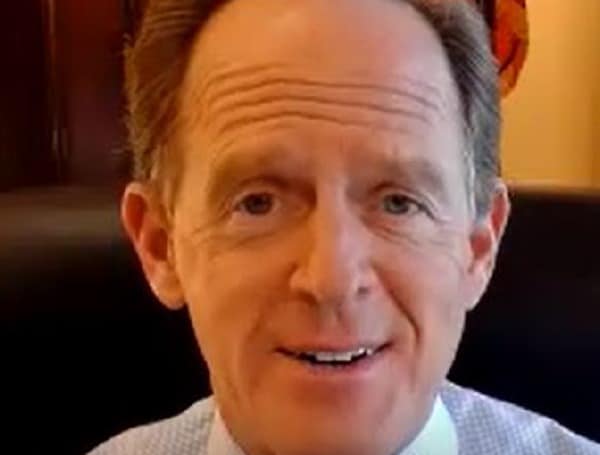Ailan Evans
Republican lawmakers are sponsoring a bill designed to protect financial transactions known as “payment for order flow,” in which brokerages route their clients’ trades to market makers.
The practice is at the heart of the burgeoning online trading industry that has helped open up the stock market to retail investors by lowering trading fees. However, regulators have targeted payment for order flow as ripe for abuse, arguing that brokerages may be incentivized to act against their clients’ interests.
Pennsylvania Republican Sen. Pat Toomey, ranking member of the Senate Banking Committee, introduced the Investor Freedom Act of 2021 in late October to protect “zero commission trading and user-friendly mobile apps” from Securities and Exchange Commission (SEC) rules that would prohibit payment for order flow. The legislation is co-sponsored by Republican Sens. Tim Scott of South Carolina and Kevin Cramer of North Dakota, who each signed onto the bill earlier in December.
Payment for order flow allows brokerages to charge lower trading fees, or often no fees at all, as instead they earn revenue by selling their clients’ trade orders to market makers such as hedge funds, who then execute the trade themselves.
The practice is employed by many of the most popular online brokerages and trading apps, including Robinhood, Charles Schwab, TD Ameritrade, E*TRADE and many others. Proponents of the practice argue that because it allows brokerages to operate without charging traders a commission, it lowers the barrier of entry for smaller retail investors, thereby democratizing the market.
Critics say the practice creates a fundamental conflict of interest as brokers may not be incentivized to route trades to the best market maker for the trader, but instead to the highest bidder. SEC Chairman Gary Gensler has even floated the idea of prohibiting the practice entirely.
“They [market makers] get the data, they get the first look, they get to match off buyers and sellers out of that order flow,” Gensler told Barron’s in August. “That may not be the most efficient markets for the 2020s.”
Toomey, who is spearheading the Investor Freedom Act, has dismissed regulators’ arguments that payment for order flow creates a conflict of interest, pointing out that the practice has benefited consumers by opening up the stock market to smaller investors.
“Tens of millions of Americans are investors who never were before, and they are therefore participating in the returns of the greatest capital market on the planet,” Toomey told Yahoo Finance in November, arguing that payment for order flow was “not the whole reason, but it’s a contributing factor.”
Charles Schwab, which operates an online trading platform and brokerage, donated $16,800 to Toomey and $9,400 to Scott during the 2016 election cycle in which both senators were running, according to campaign finance data from OpenSecrets. The firm also donated $8,100 to Cramer in 2018 during his senatorial campaign.
Morgan Stanley, the owner of E*TRADE, donated $27,200 to Toomey and $10,000 to Scott in 2016, and $2,700 to Cramer in 2018. Ally Financial donated $2,500 to Scott and $2,000 to Toomey, TD Ameritrade donated $2,700 to Cramer and The Vanguard Group contributed $7,000 to Scott and $1,400 to Toomey.
“At the end of the day, we want the stock market to be as accessible to the American people as possible. The Investor Freedom Act recognizes the new innovations and technologies that have made this a reality,” Cramer told the Daily Caller News Foundation. “Opposition to this bill seeks to reward companies who restrict access to the market for everyday Americans and stifle competition by throwing up barriers to entry for innovators.”
Cramer added that he receives “contributions from farmers and truck drivers too that appreciate good policy.”
When reached for comment, Amanda Thompson, spokeswoman for Toomey, characterized efforts to ban payment for order flow as motivated by left-wing ideology.
“Socialists are attacking Republicans for introducing legislation to protect commission-free trading because they want to make it harder and more expensive for average Americans to invest in the stock market,” Thompson told the DCNF.
She also pointed out that Toomey is not running for re-election and did not consult with brokerages before introducing the bill in response to questions about campaign contributions.
“When the Extreme Left and their allies in the press can’t win an argument on the merits, they malign Republicans’ motives. Those making this libelous smear clearly haven’t bothered to look at Senator Toomey’s career, which he has spent advocating for free markets and economic freedom,” she said.
Scott’s office did not respond to the DCNF’s request for comment.
Payment for order flow drew attention in early 2021 amid the GameStop short squeeze after retail investors were temporarily prevented from trading on certain brokerage apps. The events resulted in a House Financial Services hearing in which lawmakers questioned the practice, among other topics.
The SEC also released its report on the GameStop situation in late November echoing prominent criticisms of payment for order flow.
“These payments can create a conflict of interest for the retail broker-dealer,” the SEC wrote.
Check out Tampafp.com for Politics, Tampa Area Local News, Sports, and National Headlines. Support journalism by clicking here to our GoFundMe or sign up for our free newsletter by clicking here.
Android Users, Click Here To Download The Free Press App And Never Miss A Story. It’s Free And Coming To Apple Users Soon
